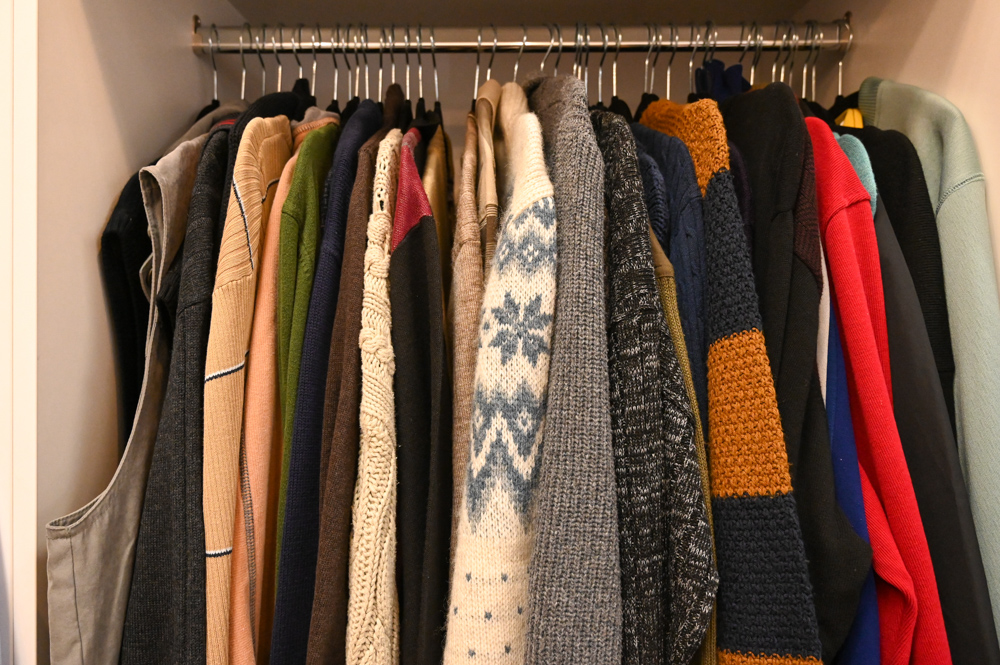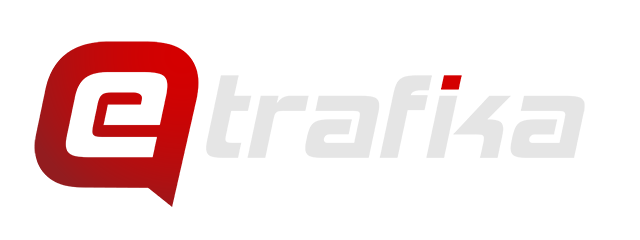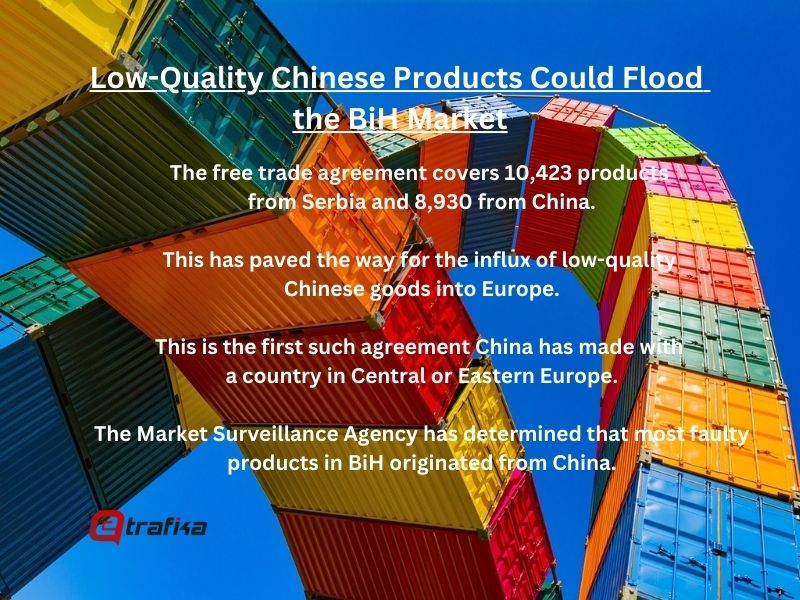Low-quality, third-rate Chinese goods could flood the market in Bosnia and Herzegovina after Serbia, just a few days ago, lifted tariffs on 90 percent of products from this country, creating a soft point for the flow of various goods, semi-products, and raw materials originating from China into the Balkan market, as well as the European Union.
Written by: Andrijana Pisarević; Cover photo: Amra Krupalija – Fotobaza.ba
On July 1st, the Free Trade Agreement between Serbia and China came into effect, and tariffs on goods originating from both countries will be completely eliminated, either automatically or gradually, on tens of thousands of products, with the possibility of exempting a certain number considered strategic.
According to announcements from Serbian officials, this country will be able to import raw materials from China at “significantly lower customs tariffs”. The Free Trade Agreement, signed by both parties on October 17th last year at the Third Belt and Road Forum for International Cooperation in Beijing, covers 10,412 products from Serbia and 8,930 from China. Notably, the EU does not have a Free Trade Agreement with China.
This is the first such agreement China has made with any Central or Eastern European country, and although it is expected to bring certain benefits for domestic producers in terms of exports, there are far greater dangers that the Balkan market, including Bosnia and Herzegovina, will now be flooded with low-quality goods from China, which has already been very difficult to control and whose technical and health compliance is questionable.
Our interlocutors claim that although, for now, the Bosnian authorities are not showing interest in doing the same as the Serbian ones and making an identical agreement, this will not save Bosnia and Herzegovina or prevent the influx of Chinese goods into its market.

Import Duties Will Also Be Lowered
“The Free Trade Agreement between these two countries implies the elimination of tariffs for all types of products originating from the signatory countries. Since tariff rates can be as high as 15 percent, this means that Chinese products in the Bosnian market will soon be significantly cheaper because the total import duties when importing these products from China to Serbia will be significantly reduced. The imports will then spill over to us and other Balkan countries, as well as the European Union, Croatia, Bulgaria, and Romania. The abolition of tariffs on Chinese goods in Serbia will indirectly but strongly affect Bosnia and Herzegovina, especially if cheaper Chinese products spill over into the Bosnian market, which could ultimately threaten domestic producers”, explains our source.
Speaking about the ways Chinese goods can enter Bosnia and Herzegovina, he explains that it will likely involve the import of semi-finished products from China, which can easily be finished and packaged to appear as Serbian goods.
Regarding the calculation of import duties, the tariff is included in the base for calculating import VAT, so if the tariff is abolished, a lower import VAT will be calculated. In this way, a large number of Chinese products could become even more accessible to the region's residents.
“Serbia could, in certain business operations, participate in the further distribution of these goods and raw materials by finishing some semi-finished products from China. Such semi-finished products, which are partially finished in Serbia, as foreseen, for example, by CEFTA or the Free Trade Agreement between Serbia and the EU, could acquire the status of products originating from Serbia and, as such, could be exported to the region and the EU and be exempt from tariffs”, says the eTrafika source, emphasizing that Bosnia and Herzegovina is already under significant economic and political influence from China through investments, loans, and political support, and that the free flow of goods, especially those known for poor quality, will only deepen the existing situation.
He believes that it is crucial for Bosnia and Herzegovina to continue adapting its customs system and trade policy in line with the European integration process to improve the competitiveness of domestic products and reduce dependence on China.

Economist Igor Gavran comments on the abolition of tariffs as a move that could be beneficial in terms of importing electronics at lower prices, warning that the state should, through its organs, protect citizens from the influx of low-quality products. It is very unlikely, says our interlocutor, that Bosnia and Herzegovina will conclude such an agreement because it is a small market and does not have significant investments for the Chinese to specifically open Bosnian borders.
“Exports to China from Serbia mostly relate to what Chinese companies do. They needed it to open up to export ores and other raw materials without duties. We do not have any Chinese production or investment, we only have work execution. We also have no interest in this agreement because our exports there are not significant”, says Gavran, adding that it is not excluded that Bosnia and Herzegovina itself might offer such an initiative, but it is questionable what China would even respond.
Most Faulty Goods Came from China
The Inspectorate of Republika Srpska told us that during importation, they control non-food products classified as items of general use, such as children's toys, cosmetics and hygiene products, dishes, cutlery, and other materials that come into contact with food, as well as other items that come into direct contact with the skin and mucous membranes. They said this is done through random sampling but added that not everything is controlled.

Last year, out of 730 inspected shipments, six did not meet the prescribed conditions and were banned from import. In 2022, 650 samples were taken, and import was banned for 11 shipments.
“Looking at past years, when it comes to products from China, it can be said that irregularities were most often found in children's toys due to phthalate content above reference values, easy extraction of threads and hair, unpleasant odor, easy separation of small parts, and similar issues. Other products, such as household appliances, clothing, footwear, various technical equipment, etc., are not subject to mandatory control during import”, said the Inspectorate of RS. They added that based on their data on the country of origin of faulty products, it is clear that a significant number originate from China.

The Market Surveillance Agency of Bosnia and Herzegovina conducted 238 inspections last year and found that out of 197 different product models, 107, or 54.3 percent, did not meet the prescribed safety requirements. As a result of these activities, 8,828 pieces of products were withdrawn from the market.
“In 2023, the Agency initiated 19 follow-up market surveillance cases, and in 13 cases, non-compliance and faults were found. As a result of these activities, 374 pieces of unsafe products were withdrawn from the market”, states the agency's report for last year.
Analysis of the results showed that most of the unsafe products with serious risks to consumers originated from China. Of these 50, 42 such products came from the mentioned country. These mostly included electrical equipment, toys, sports and recreational products, children's products, personal protective equipment, jewelry, and textile products.

Caution with Spices
Snežana Šešlija from the Doboj consumer protection association “Topeer” says that tariffs do not necessarily have to be abolished because a huge number of stores in Bosnia and Herzegovina have their channels through which goods from China are delivered. She explains that their research showed that first-class goods from China arrive in large cities and their stores, but in smaller towns, the quality is generally very poor.
However, she believes that the abolition of tariffs in Serbia will definitely harm Bosnia and Herzegovina's economy and potentially endanger the health of its citizens.

“Those who shop in large shopping centers in cities will have more access to quality goods, but I doubt that will happen here. I even think the quality will be worse. It's not just clothing; there are toys and electrical goods. It's dangerous because the Chinese have slightly different safety regulations for toys and textiles, especially the dyes they use for coloring, phthalates, and technical goods. Lowering tariffs triggers a series of negative consequences. Hopefully, it will all end with cheap clothes and small appliances, but I doubt it. Now, attention must be paid to consumer goods that could be dangerous. Also, we import a lot of food, additives, and spices, which can also be very problematic”, Šešlija tells eTrafika.

How Much Do We Import from China?
In 2022, China was Serbia's second most significant foreign trade partner after Germany, with the volume of trade between Serbia and China amounting to 6.15 billion dollars. However, imports from China were 4.98 billion dollars, while exports from Serbia were 1.17 billion dollars, primarily from the steel mill in Smederevo, now owned by the Chinese HBIS Group, and the company “Zijin”, a Chinese mining giant that became the majority owner of the Mining and Smelting Basin (RTB) Bor, the only copper producer, six years ago.
In 2023, the total value of goods imported from China to Bosnia and Herzegovina was 1.077 billion BAM, while we exported slightly over 36 million BAM to China. The previous year, we imported goods worth 900 million BAM and exported about 38 million BAM worth of goods.

When we look at the structure of foreign trade, we import the most machines, appliances, vehicles, and other devices from China, followed by ores and metals, textiles, fur, plastic, rubber, chemical products, and more. The new influx of Chinese goods may not directly impact the competitiveness of Bosnian products in the Chinese market, as Bosnia and Herzegovina does not have a similar agreement. However, it could have indirect effects if cheaper Chinese products spill over into the Bosnian market.
EU to Impose Tariffs on Cheap Chinese Goods
Meanwhile, the EU is considering imposing tariffs on cheap goods purchased on Chinese online platforms such as Temu, Shein, and Aliexpress, according to a recent Financial Times report citing three anonymous informed sources.
“Under current EU regulations, packages purchased online from non-EU countries are exempt from tariffs if their value is below 150 euros. The European Commission (EC) will propose later this month to remove this threshold. The EC highlighted that last year, two billion packages valued below 150 euros arrived in the EU from abroad, adding that such a volume of online trade tests the limits and capabilities of customs”, the newspaper reported.
Additionally, part of the EU wants to impose tariffs on Chinese cars, especially France, while Germany opposes this. A vote on this issue is expected to take place in the coming weeks. In response, China has stated that it could also impose tariffs on EU products, such as pork, cognac, and luxury cars. The EC argues that tariffs are necessary to counteract cheap loans, land, raw materials, and other Chinese subsidies.







